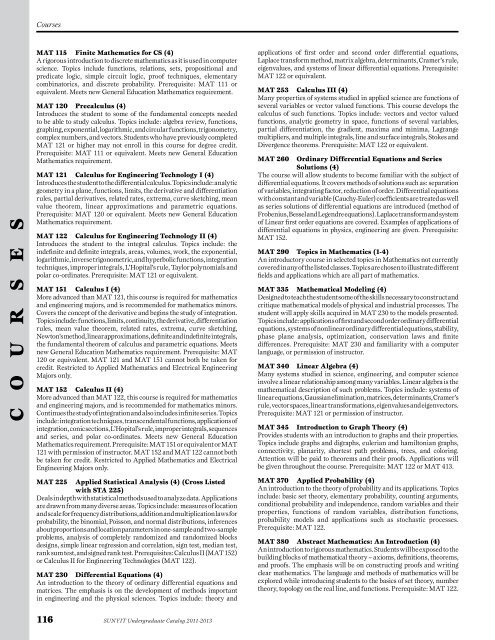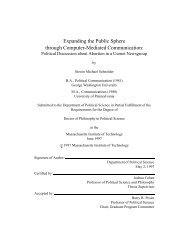Undergraduate Catalog 2011-2013 - SUNY Institute of Technology
Undergraduate Catalog 2011-2013 - SUNY Institute of Technology
Undergraduate Catalog 2011-2013 - SUNY Institute of Technology
Create successful ePaper yourself
Turn your PDF publications into a flip-book with our unique Google optimized e-Paper software.
Courses<br />
C O U R S E S<br />
MAT 115 Finite Mathematics for CS (4)<br />
A rigorous introduction to discrete mathematics as it is used in computer<br />
science. Topics include functions, relations, sets, propositional and<br />
predicate logic, simple circuit logic, pro<strong>of</strong> techniques, elementary<br />
combinatorics, and discrete probability. Prerequisite: MAT 111 or<br />
equivalent. Meets new General Education Mathematics requirement.<br />
MAT 120 Precalculus (4)<br />
Introduces the student to some <strong>of</strong> the fundamental concepts needed<br />
to be able to study calculus. Topics include: algebra review, functions,<br />
graphing, exponential, logarithmic, and circular functions, trigonometry,<br />
complex numbers, and vectors. Students who have previously completed<br />
MAT 121 or higher may not enroll in this course for degree credit.<br />
Prerequisite: MAT 111 or equivalent. Meets new General Education<br />
Mathematics requirement.<br />
MAT 121 Calculus for Engineering <strong>Technology</strong> I (4)<br />
Introduces the student to the differential calculus. Topics include: analytic<br />
geometry in a plane, functions, limits, the derivative and differentiation<br />
rules, partial derivatives, related rates, extrema, curve sketching, mean<br />
value theorem, linear approximations and parametric equations.<br />
Prerequisite: MAT 120 or equivalent. Meets new General Education<br />
Mathematics requirement.<br />
MAT 122 Calculus for Engineering <strong>Technology</strong> II (4)<br />
Introduces the student to the integral calculus. Topics include: the<br />
indefinite and definite integrals, areas, volumes, work, the exponential,<br />
logarithmic, inverse trigonometric, and hyperbolic functions, integration<br />
techniques, improper integrals, L’Hopital’s rule, Taylor polynomials and<br />
polar co‐ordinates. Prerequisite: MAT 121 or equivalent.<br />
MAT 151 Calculus I (4)<br />
More advanced than MAT 121, this course is required for mathematics<br />
and engineering majors, and is recommended for mathematics minors.<br />
Covers the concept <strong>of</strong> the derivative and begins the study <strong>of</strong> integration.<br />
Topics include: functions, limits, continuity, the derivative, differentiation<br />
rules, mean value theorem, related rates, extrema, curve sketching,<br />
Newton’s method, linear approximations, definite and indefinite integrals,<br />
the fundamental theorem <strong>of</strong> calculus and parametric equations. Meets<br />
new General Education Mathematics requirement. Prerequisite: MAT<br />
120 or equivalent. MAT 121 and MAT 151 cannot both be taken for<br />
credit. Restricted to Applied Mathematics and Electrical Engineering<br />
Majors only.<br />
MAT 152 Calculus II (4)<br />
More advanced than MAT 122, this course is required for mathematics<br />
and engineering majors, and is recommended for mathematics minors.<br />
Continues the study <strong>of</strong> integration and also includes infinite series. Topics<br />
include: integration techniques, transcendental functions, applications <strong>of</strong><br />
integration, conic sections, L’Hopital’s rule, improper integrals, sequences<br />
and series, and polar co-ordinates. Meets new General Education<br />
Mathematics requirement. Prerequisite: MAT 151 or equivalent or MAT<br />
121 with permission <strong>of</strong> instructor. MAT 152 and MAT 122 cannot both<br />
be taken for credit. Restricted to Applied Mathematics and Electrical<br />
Engineering Majors only.<br />
MAT 225 Applied Statistical Analysis (4) (Cross Listed<br />
with STA 225)<br />
Deals in depth with statistical methods used to analyze data. Applications<br />
are drawn from many diverse areas. Topics include: measures <strong>of</strong> location<br />
and scale for frequency distributions, addition and multiplication laws for<br />
probability, the binomial, Poisson, and normal distributions, inferences<br />
about proportions and location parameters in one‐sample and two‐sample<br />
problems, analysis <strong>of</strong> completely randomized and randomized blocks<br />
designs, simple linear regression and correlation, sign test, median test,<br />
rank sum test, and signed rank test. Prerequisites: Calculus II (MAT 152)<br />
or Calculus II for Engineering Technologies (MAT 122).<br />
MAT 230 Differential Equations (4)<br />
An introduction to the theory <strong>of</strong> ordinary differential equations and<br />
matrices. The emphasis is on the development <strong>of</strong> methods important<br />
in engineering and the physical sciences. Topics include: theory and<br />
applications <strong>of</strong> first order and second order differential equations,<br />
Laplace transform method, matrix algebra, determinants, Cramer’s rule,<br />
eigenvalues, and systems <strong>of</strong> linear differential equations. Prerequisite:<br />
MAT 122 or equivalent.<br />
MAT 253 Calculus III (4)<br />
Many properties <strong>of</strong> systems studied in applied science are functions <strong>of</strong><br />
several variables or vector valued functions. This course develops the<br />
calculus <strong>of</strong> such functions. Topics include: vectors and vector valued<br />
functions, analytic geometry in space, functions <strong>of</strong> several variables,<br />
partial differentiation, the gradient, maxima and minima, Lagrange<br />
multipliers, and multiple integrals, line and surface integrals, Stokes and<br />
Divergence theorems. Prerequisite: MAT 122 or equivalent.<br />
MAT 260 Ordinary Differential Equations and Series<br />
Solutions (4)<br />
The course will allow students to become familiar with the subject <strong>of</strong><br />
differential equations. It covers methods <strong>of</strong> solutions such as: separation<br />
<strong>of</strong> variables, integrating factor, reduction <strong>of</strong> order. Differential equations<br />
with constant and variable (Cauchy-Euler) coefficients are treated as well<br />
as series solutions <strong>of</strong> differential equations are introduced (method <strong>of</strong><br />
Frobenius, Bessel and Legendre equations). Laplace transform and system<br />
<strong>of</strong> Linear first order equations are covered. Examples <strong>of</strong> applications <strong>of</strong><br />
differential equations in physics, engineering are given. Prerequisite:<br />
MAT 152.<br />
MAT 290 Topics in Mathematics (1-4)<br />
An introductory course in selected topics in Mathematics not currently<br />
covered in any <strong>of</strong> the listed classes. Topics are chosen to illustrate different<br />
fields and applications which are all part <strong>of</strong> mathematics.<br />
MAT 335 Mathematical Modeling (4)<br />
Designed to teach the student some <strong>of</strong> the skills necessary to construct and<br />
critique mathematical models <strong>of</strong> physical and industrial processes. The<br />
student will apply skills acquired in MAT 230 to the models presented.<br />
Topics include: applications <strong>of</strong> first and second order ordinary differential<br />
equations, systems <strong>of</strong> nonlinear ordinary differential equations, stability,<br />
phase plane analysis, optimization, conservation laws and finite<br />
differences. Prerequisite: MAT 230 and familiarity with a computer<br />
language, or permission <strong>of</strong> instructor.<br />
MAT 340 Linear Algebra (4)<br />
Many systems studied in science, engineering, and computer science<br />
involve a linear relationship among many variables. Linear algebra is the<br />
mathematical description <strong>of</strong> such problems. Topics include: systems <strong>of</strong><br />
linear equations, Gaussian elimination, matrices, determinants, Cramer’s<br />
rule, vector spaces, linear transformations, eigenvalues and eigenvectors.<br />
Prerequisite: MAT 121 or permission <strong>of</strong> instructor.<br />
MAT 345 Introduction to Graph Theory (4)<br />
Provides students with an introduction to graphs and their properties.<br />
Topics include graphs and digraphs, eulerian and hamiltonian graphs,<br />
connectivity, planarity, shortest path problems, trees, and coloring.<br />
Attention will be paid to theorems and their pro<strong>of</strong>s. Applications will<br />
be given throughout the course. Prerequisite: MAT 122 or MAT 413.<br />
MAT 370 Applied Probability (4)<br />
An introduction to the theory <strong>of</strong> probability and its applications. Topics<br />
include: basic set theory, elementary probability, counting arguments,<br />
conditional probability and independence, random variables and their<br />
properties, functions <strong>of</strong> random variables, distribution functions,<br />
probability models and applications such as stochastic processes.<br />
Prerequisite: MAT 122.<br />
MAT 380 Abstract Mathematics: An Introduction (4)<br />
An introduction to rigorous mathematics. Students will be exposed to the<br />
building blocks <strong>of</strong> mathematical theory – axioms, definitions, theorems,<br />
and pro<strong>of</strong>s. The emphasis will be on constructing pro<strong>of</strong>s and writing<br />
clear mathematics. The language and methods <strong>of</strong> mathematics will be<br />
explored while introducing students to the basics <strong>of</strong> set theory, number<br />
theory, topology on the real line, and functions. Prerequisite: MAT 122.<br />
116 <strong>SUNY</strong>IT <strong>Undergraduate</strong> <strong>Catalog</strong> <strong>2011</strong>-<strong>2013</strong>
















